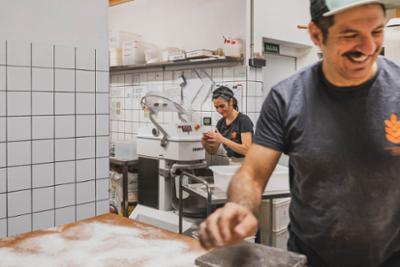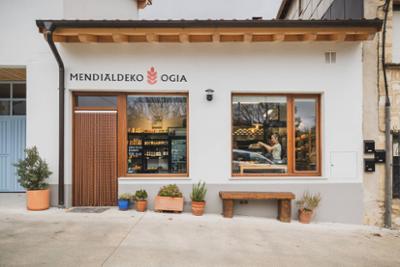

Natxo Beltrán, "making bread in a rural environment has infinite advantages"

Mendialdeko Ogia makes artisanal and organic bread. We talked to one of its co-owners to discover the advantages and disadvantages of working in a small village in Álava.
The story of Mendialdeko Ogia began in 2012, when Natxo Beltrán and Anna Montserrat decided to turn their lives around. From living in the centre of Barcelona and working in a textile multinational, they moved to Maeztu, a small village in Álava, to make artisanal, organic bread.
For Natxo, this change in direction has only brought good things. And not only because it means a better quality of life, but also because this has made it easier to reconcile work and family life.
Rural SICOP interview with Natxo Beltrán, co-owner of Medialdeko Ogia
1.- What are the advantages and disadvantages for a baker working in a rural environment?
Every rural environment is different. The only disadvantage in our case is the lack of a constant flow of customers, since in Álava the villages are very small. We decided to account for this risk by sharing out part of the production in order to find a balance between working days and holidays and winter and summer. When there is no guarantee of demand, we increase deliveries.
In our opinion, the advantages are endless: it is easier to set up, there is some help for starting up in rural areas, a better quality of life as a result of the natural environment and the ease of reconciliation: it is easier to get to know and collaborate with some of the suppliers of the raw materials we use. We even believe that it has helped us to find colleagues who will work with us on a stable basis and with whom we share the project. We are all looking for quality of life and reconciliation.
2.- What are the keys to being popular and attracting people from other nearby towns?
I don't know if we are popular, but nowadays the key is communication. If you have a project with values, you are honest and transparent and you use quality raw materials, you just have to be able to communicate this to the consumer who is looking for this food option. Nowadays, in the digital era, being in a rural environment is not an obstacle to communication.
3.- Does having a bakery in a village force you to adjust costs and adapt to the tastes of a very specific clientele? Or, on the contrary, does it allow you to be creative and experiment?
We understand that nowadays in any activity you have to be careful with expenses. However, access to a shop or a warehouse is much cheaper in rural areas, which limits a significant fixed cost and makes us more resilient for bad times. In our case, the engine of the bakery is a wood-fired ring-tube oven, which last year, with the speculative ups and downs of energy prices, was also a good option to cushion us from those ups and downs. Firewood in rural areas is always viable and infinitely easier to manage than in an urban environment. In the village you are usually also the owner of your roof, so you can install panels to cover your electricity consumption and charge an electric vehicle for delivery, and for us, converting such variable expenses due to speculation into a fixed amortisation gives us great peace of mind.
In terms of products, we started with a very specific profile aimed at delivering to the organic market, but once we saw the viability of the project we have gradually opened up the range of products and this is something we love. In addition to the loaves we started with, we have been able to work on the recovery of local varieties of wheat, making bread with them and promoting them. We have been collaborating with some catering establishments that value our product and even sharing the road with the Arrea! restaurant (recent Michelin star) in the neighbouring town of Santa Cruz de Campezo, with whom we have been challenged to work with ingredients such as chestnuts, acorns and liken. And, most importantly for us, we have managed to become the bakers of the grandparents in our village and other nearby villages, who are delighted with our muffins, sponge cakes and pastries and tell us that here we do make bread the old-fashioned way!
4.- Does the fact that you are not in a big city cause you any problems when it comes to getting all the products you need? Do you have to place larger orders or order more in advance?
Orders in rural areas always take a day longer, but nothing that can't be overcome with a bit of foresight and a small warehouse.
5.- Do factors such as the weather influence the normal operation of the bakery?
Of course, temperatures affect the processes and that is something that all of us have to deal with, especially in the more artisanal processes. We are in Mendialdea or Montaña alavesa (Mendialdeko ogia means bread from the mountain area), so we have cool nights practically all year round which, despite having a wood-fired oven, with good ventilation we are able to work at warm but pleasant temperatures almost all the time. Our biggest adventure has been snow, but with good tyres and a bit of experience on the road we have always coped well. In 10 years we have never missed a delivery in the snow.
6.- What message would you give to all those colleagues who want to settle in a village but have not yet taken the plunge?
I am in love with the rural environment, so I would encourage them to look for a quieter life, not only my colleagues, but everyone. Working just a few metres from home, being able to take a walk in the woods with the dog during a break from work, having a vegetable garden and some time to tend it or being able to raise pigs or chickens with the bread that is not sold, for us these are irrefutable arguments. And for those who fear a quiet life, we would like to say that in rural areas there is a very intense social and cultural life and it is difficult not to be part of it.





